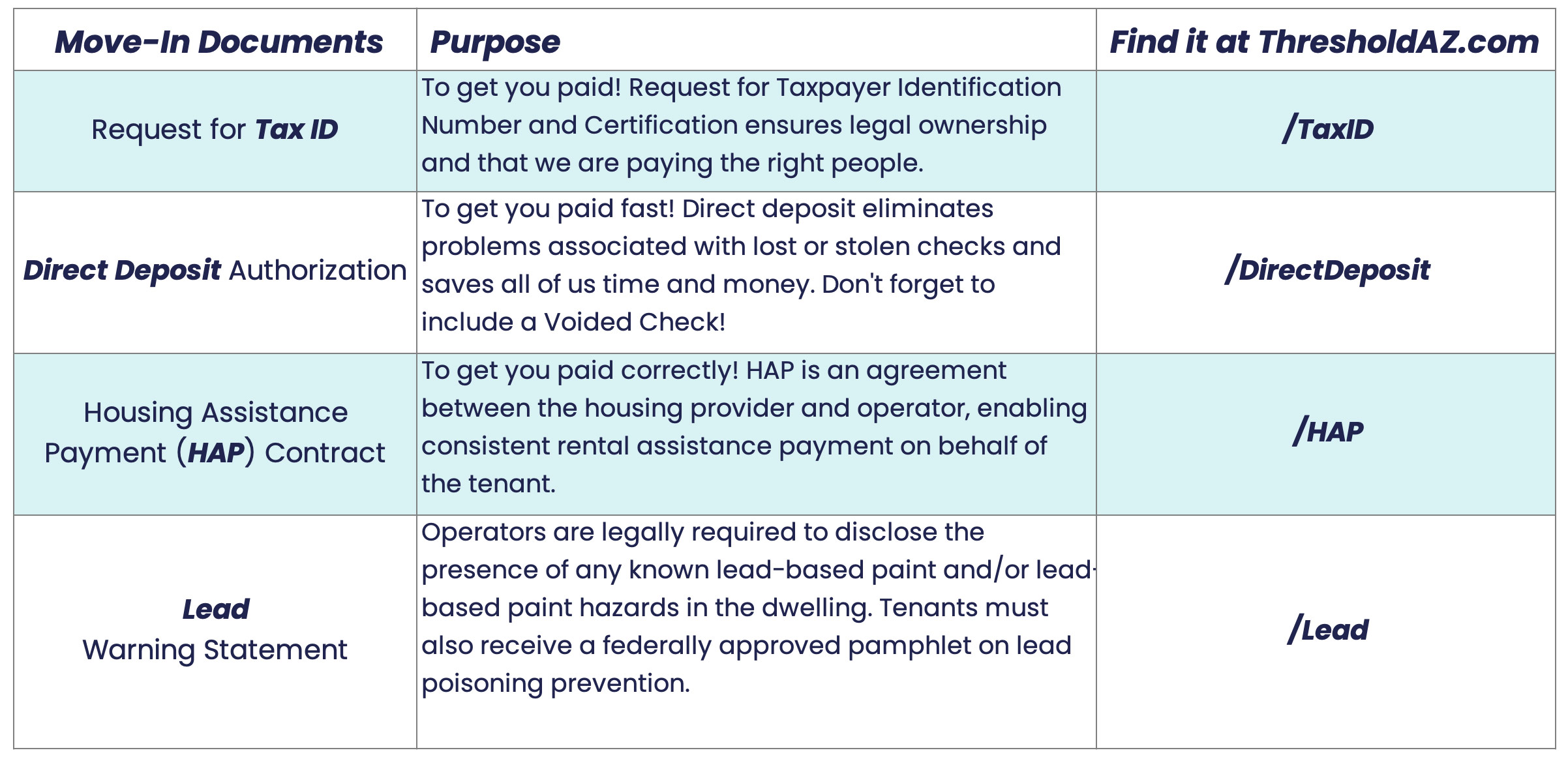At Threshold, we work to foster successful housing partnerships between property owners and individuals transitioning from homelessness — including those with pets and service animals. For property owners and operators, understanding the distinctions between pets, service animals, and emotional support animals is essential. Each category comes with its own legal considerations, particularly under Fair Housing regulations.
This blog incorporates input from Leanna Taylor, CEO of The Arizona Pet Project (AZPP) and an expert in helping get people and their pets off the streets and into stable housing. Taylor highlights the importance of owners and operators as partners in Arizona’s efforts to end homelessness: “We would ask landlords to consider themselves a critical piece of the puzzle in reducing homelessness in our communities, which disproportionately impacts pet-owning households,” says Taylor. “The only way we will solve this growing crisis is by recognizing our respective roles and coming together to provide tangible solutions.”
The goal of this blog is to guide property owners through the essentials of service animals, emotional support animals, and pets, offering clarity on legal obligations and practical partnerships to address this pressing challenge.

Understanding the roles of pets, service animals, and emotional support animals is key to fostering inclusive, stable housing partnerships—especially for individuals transitioning out of homelessness.
Please note: This blog is intended to provide general guidance on service animals and rent assistance topics. It should not be construed as legal advice. Every tenancy situation is unique and property owners are strongly encouraged to consult a qualified attorney for specific legal questions or concerns about service animals, reasonable accommodations, or Fair Housing compliance.
Pets vs. Service Animals vs. Emotional Support Animals
When it comes to tenants and animals, property owners need to clearly distinguish between three categories: pets, service animals, and emotional support animals.
Pets
Pets are personal companion animals that are not protected under the Fair Housing Act. Property owners and operators may set their own rules regarding pets, including pet fees, deposits, and breed or size restrictions.
The most common types of pets are:
- Dogs (by far the most popular)
- Cats
- Fish (bettas, goldfish)
- Birds (parakeets, cockatiels)
- Small mammals (hamsters, guinea pigs, rabbits)
- Reptiles (turtles, snakes, lizards)
Pets are typically kept for companionship and have no special legal protections.
Service Animals
Service animals are specially trained animals — usually dogs, but sometimes miniature horses — that perform specific tasks for individuals with disabilities. Under the Americans with Disabilities Act (ADA) and the Fair Housing Act, service animals are not considered pets. Tasks performed can range from guiding individuals who are blind to detecting seizures or assisting with psychiatric disabilities.
Under the ADA, service animals are limited to dogs and sometimes miniature horses.
- Dogs: In most cases, dogs are the only animal recognized under the ADA as a service animal.
- Miniature horses: Miniature horses are the only other species sometimes recognized under the ADA for limited-service roles (such as mobility assistance). However, they are far less common and come with additional facility requirements.

Service animals are specially trained to assist individuals with disabilities and are legally distinct from pets under the ADA and Fair Housing Act.
Emotional Support Animals
Emotional Support Animals (ESAs) provide therapeutic emotional support to individuals diagnosed with mental health conditions. While ESAs do not require specialized training like service animals, they are still considered assistance animals under Fair Housing law and are entitled to reasonable accommodations.
Unlike service animals, ESAs can be almost any animal that provides emotional support:
- Dogs (most common by far)
- Cats (second most common)
- Rabbits
- Birds (parrots, cockatiels)
- Ferrets
- Small rodents (hamsters, guinea pigs)
- Reptiles (rare, but some people have ESA turtles or lizards)
Recognizing the key differences between pets, service animals, and emotional support animals helps property owners and operators uphold their legal responsibilities while maintaining control over their rental properties.

Emotional Support Animals (ESAs) offer vital emotional support for individuals with mental health conditions and are protected under Fair Housing law, even without specialized training.
What Landlords Can (and Can’t) Ask About Service Animals
Understanding your rights and responsibilities as a property owner when it comes to service animals and emotional support animals is critical. While you have the right to verify certain information, federal laws tightly regulate what you can ask tenants.
Here’s what landlords can request: For service animals, landlords may ask two questions if the need for the animal is not obvious:
- “Is this a service animal required because of a disability?”
- “What work or task has the animal been trained to perform?”
For emotional support animals (ESAs), property owners and operators can request documentation from a licensed healthcare provider verifying the need for the ESA due to a disability.
However, they cannot:
- Demand certification, licenses, or special identification for service animals.
- Ask about the nature or severity of a tenant’s disability.
- Charge pet fees, deposits, or surcharges for service animals or ESAs.
- Require service animals to wear special vests or harnesses identifying them as working animals.
It’s important to handle all conversations about service animals respectfully and in compliance with Fair Housing guidelines. Missteps can lead to costly discrimination claims.
Taylor notes that a common misconception among property owners and operators is not understanding that ESAs are protected under the Fair Housing Act.
“This means housing providers cannot charge extra rent, pet fees, or deposits for an ESA and cannot deny an ESA based on the animal’s breed or size unless it constitutes a threat or significant property damage,” Taylor explains.
She adds that ESAs are also not subject to breed or size restrictions and don’t count toward limitations on the number of pets.

Landlords must follow strict rules when asking about service and emotional support animals to ensure fair housing and avoid discrimination.
Managing Pet Policies in Padmission
Padmission, our internet listing service, gives property owners the flexibility to decide whether to allow pets at each of their properties.
How to Enable Pets for Your Rental
To update your pet policy:
- Select the rental property you want to modify.
- Click “Edit Property.”
- Navigate to Step 5: Pet Policy.
- Choose Yes or No to indicate whether pets are allowed.
- If allowing pets, enter details as needed: a. Monthly pet rent (paid monthly) b. Pet deposit (paid upfront, refundable at lease end) c. Pet fee (paid upfront, non-refundable one-time charge)
- Specify additional pet-related policies: a. Total number of pets allowed b. Breed/size restrictions (Yes or No) c. Additional restrictions (e.g., “No aggressive breeds”)
- Click “Submit.”
Be sure to repeat this process for any other properties where you want to allow pets.
Do’s and Don’ts
Providing accommodations for tenants with service animals and emotional support animals (ESAs) doesn’t have to be complicated. Doing it right not only protects you legally—it also fosters a more inclusive and respectful rental environment.
Below are key do’s and don’ts to help you navigate the process:
✅ DO: Have a Clear Policy and Process
- Implement a Reasonable Accommodation policy that complies with Fair Housing laws.
- Train all staff so they understand how to handle service animal or ESA requests properly and respectfully.
❌ DON’T: Request Special Certification
- Service animals are not required to carry ID, licenses, or certificates. Requesting them may violate Fair Housing laws.
✅ DO: Focus on the Animal’s Behavior
- Approve or deny accommodations based on how the animal behaves, not on its breed, size, or appearance.
❌ DON’T: Rely on Stereotypes
- Denying a request solely because of a breed or size is not allowed. Fair Housing laws require an individualized assessment.
✅ DO: Keep Good Records
- Document all accommodation requests, interactions, and responses. This helps in case of future disputes or audits.
❌ DON’T: Delay Your Response
- Failing to respond in a timely manner can be viewed as a Fair Housing violation. Address each request promptly and thoroughly.
✅ DO: Respect Privacy
- You may ask for reliable documentation when the disability or need for an ESA isn’t obvious—but only what’s necessary.
❌ DON’T: Ask Intrusive Medical Questions
- Never require tenants to disclose specific diagnoses or detailed medical history.
✅ DO: Leverage Community Resources
- When tenants have pets that aren’t service animals or ESAs, organizations like The Arizona Pet Project may help with fostering, support, or financial aid for deposits.
By following these best practices and avoiding common missteps, landlords can minimize legal risk, promote fairness, and maintain positive tenant relationships.

Clear policies, respectful communication, and fair assessments help landlords provide proper accommodations for service and emotional support animals—creating inclusive, compliant rental communities.
Addressing Protections for Renters with Pets or Assistance Animals
Despite existing laws, renters with pets or assistance animals in Arizona face challenges due to misinformation and inconsistent application of protections.
“In 2023, AZPP began its statewide expansion after operating for two decades in Maricopa County,” says Taylor. “The subject that came up more than any other was the issue of ESAs and the discrimination people were facing across the housing and shelter continuum.”
Taylor believes the issue is less about lacking protections and more about the need for better education and clarity around existing laws like the Fair Housing Act. AZPP and its subsidiary, the Arizona Coalition for People and Pets, are working to increase awareness and ensure compliance through education on ESA rights and documentation requirements.
Taylor also advocates for a shift from pet-accessible to pet-inclusive housing.
“This shift will open the door for many of our most vulnerable community members who are being forced to choose between their four-legged family members and a safe, affordable roof over their head,” she says.
Advice for Hesitant Landlords
For landlords hesitant to rent to tenants with pets or assistance animals, Taylor offers practical advice grounded in research.
“Our friends at the Pet Inclusive Housing Initiative have conducted years of research showing that pet-inclusive housing is not just good, but great, for business,” she says.
Recent studies by the Pet-Inclusive Housing Initiative highlight benefits like increased profitability and tenant stability, while dispelling myths about pet-related damage, which is often less significant than assumed. A new report from the initiative is expected in mid-2025.
Frequently Asked Questions
Here are a few frequently asked questions about service animals, emotional support animals, and pets.
Can I charge a pet deposit for service animals?
No. Service animals and emotional support animals are not considered pets under the law. Therefore, property owners cannot charge pet deposits, pet rent, or pet fees for them.
How do I verify that an animal is truly a service animal?
Property owners and operators can only ask two specific questions: (1) “Is this a service animal required because of a disability?” and (2) “What work or task has the animal been trained to perform?” You cannot demand documentation, certification, or inquire about the tenant’s disability.
What if a service animal damages my property?
Tenants are responsible for any damage caused by their service animals, just like they would be for any damage they personally cause. Property owners are allowed to charge for repairs beyond normal wear and tear at the end of the tenancy.
Can I deny housing if I think a service animal is dangerous?
Only if there is objective evidence that the specific animal poses a direct threat to the health or safety of others. Breed, size, or type of animal alone are not sufficient reasons to deny accommodation.
Final Thoughts
Navigating the complexities of service animals, emotional support animals, and pets can feel daunting, but understanding your rights and responsibilities as a landlord opens the door to creating a more compassionate and inclusive community. By distinguishing between pets and assistance animals, adhering to Fair Housing guidelines, and treating tenants with respect, you can foster a welcoming environment that honors the profound bond between people and their animals.














